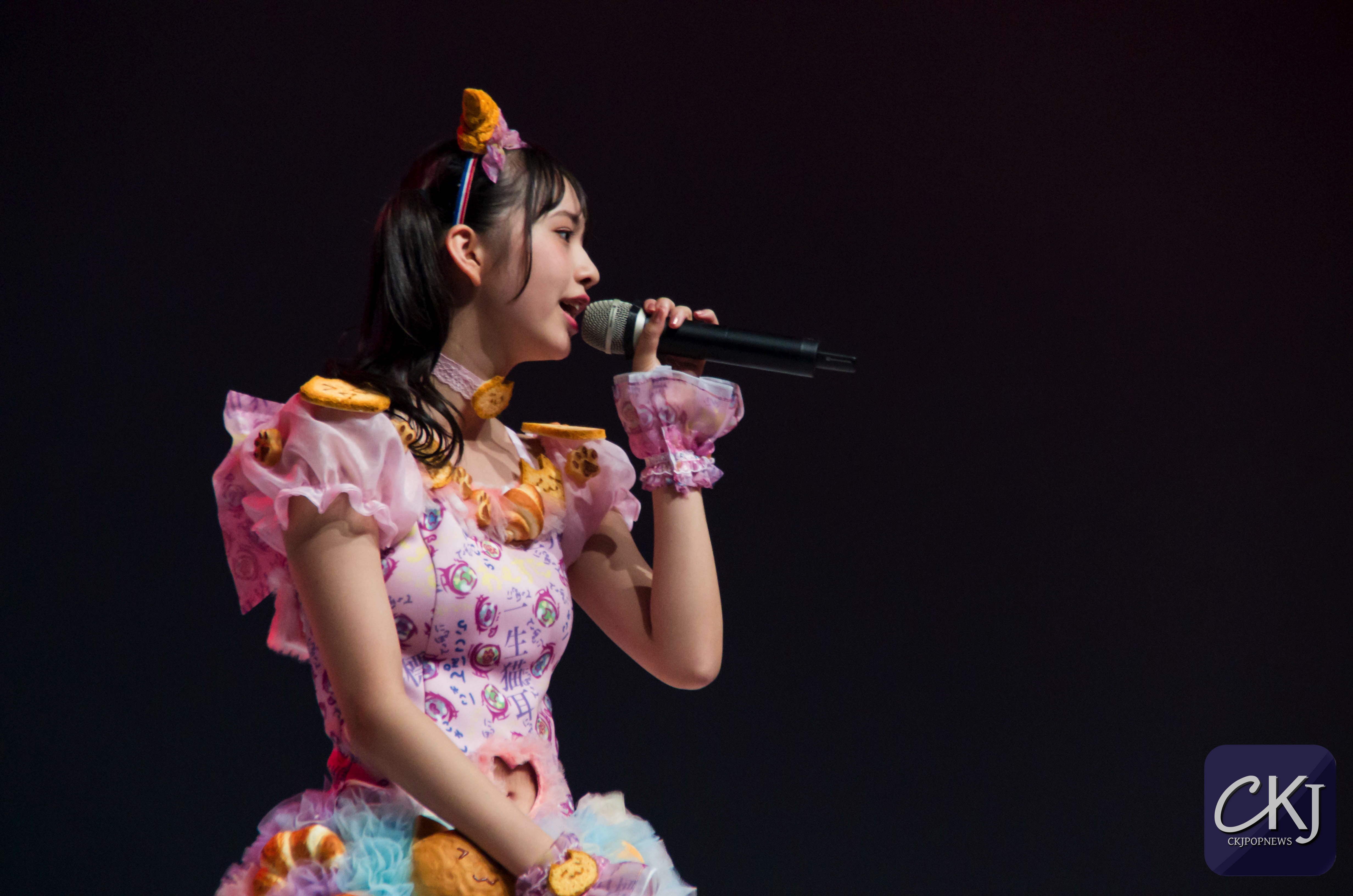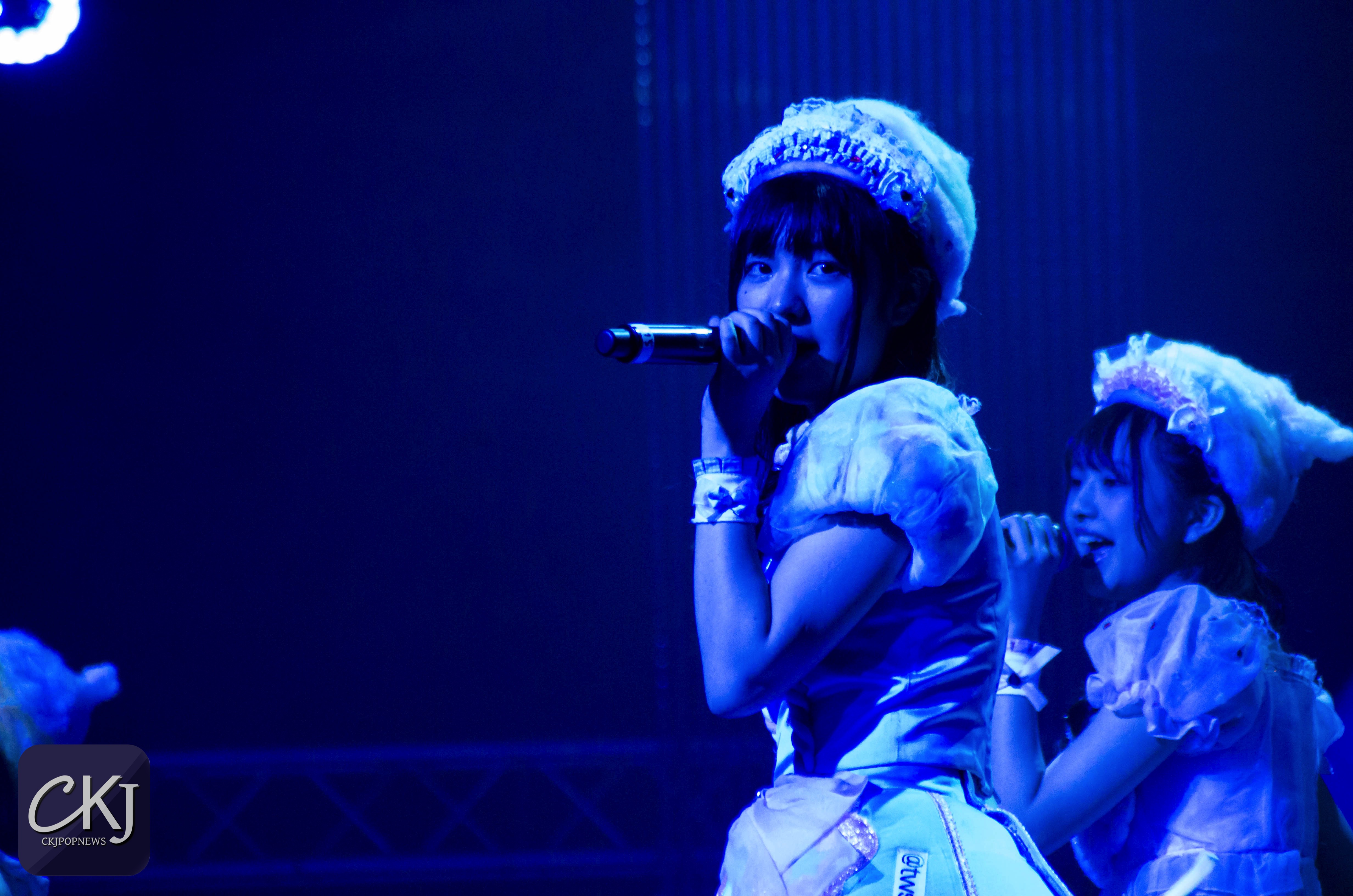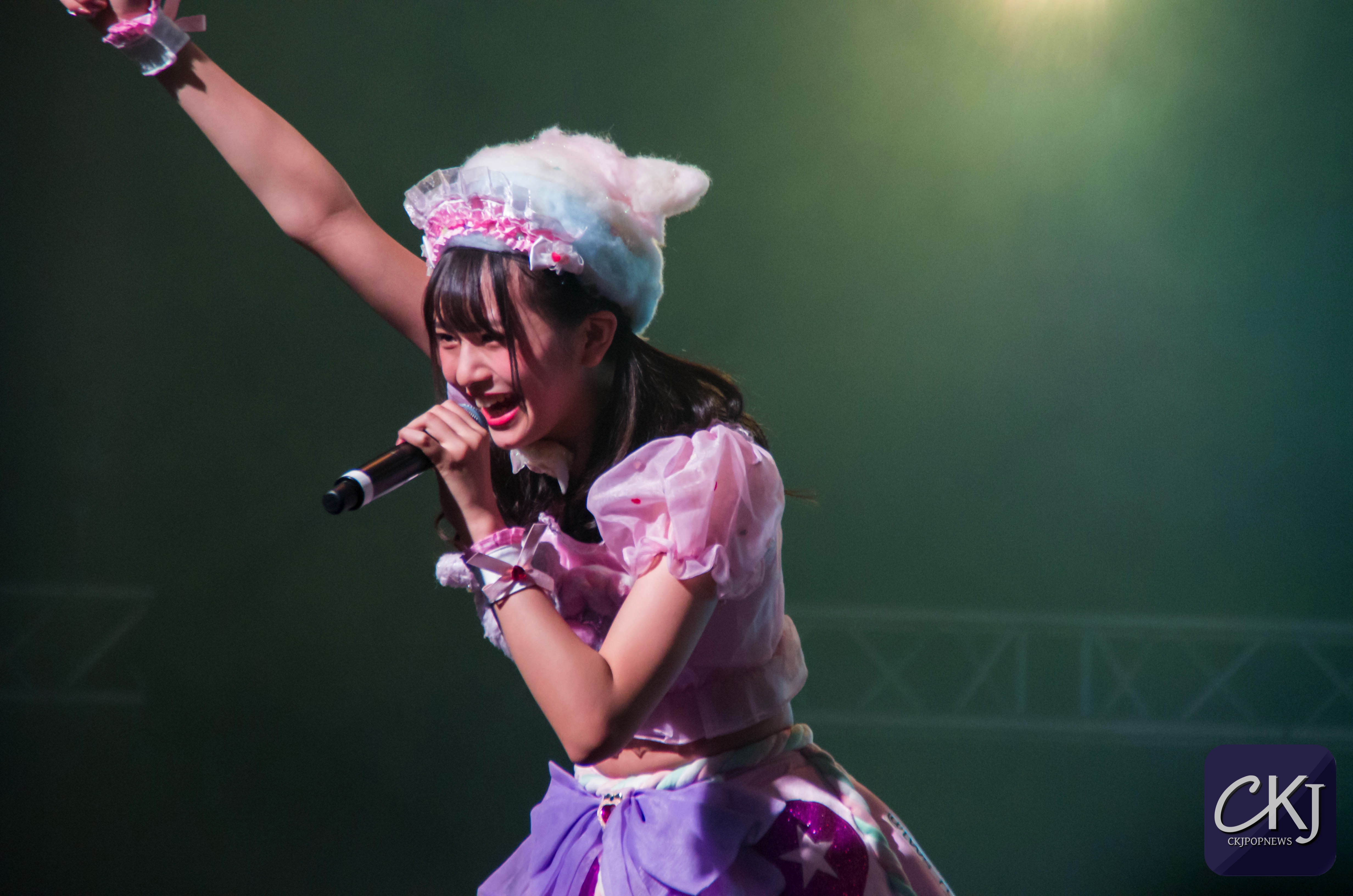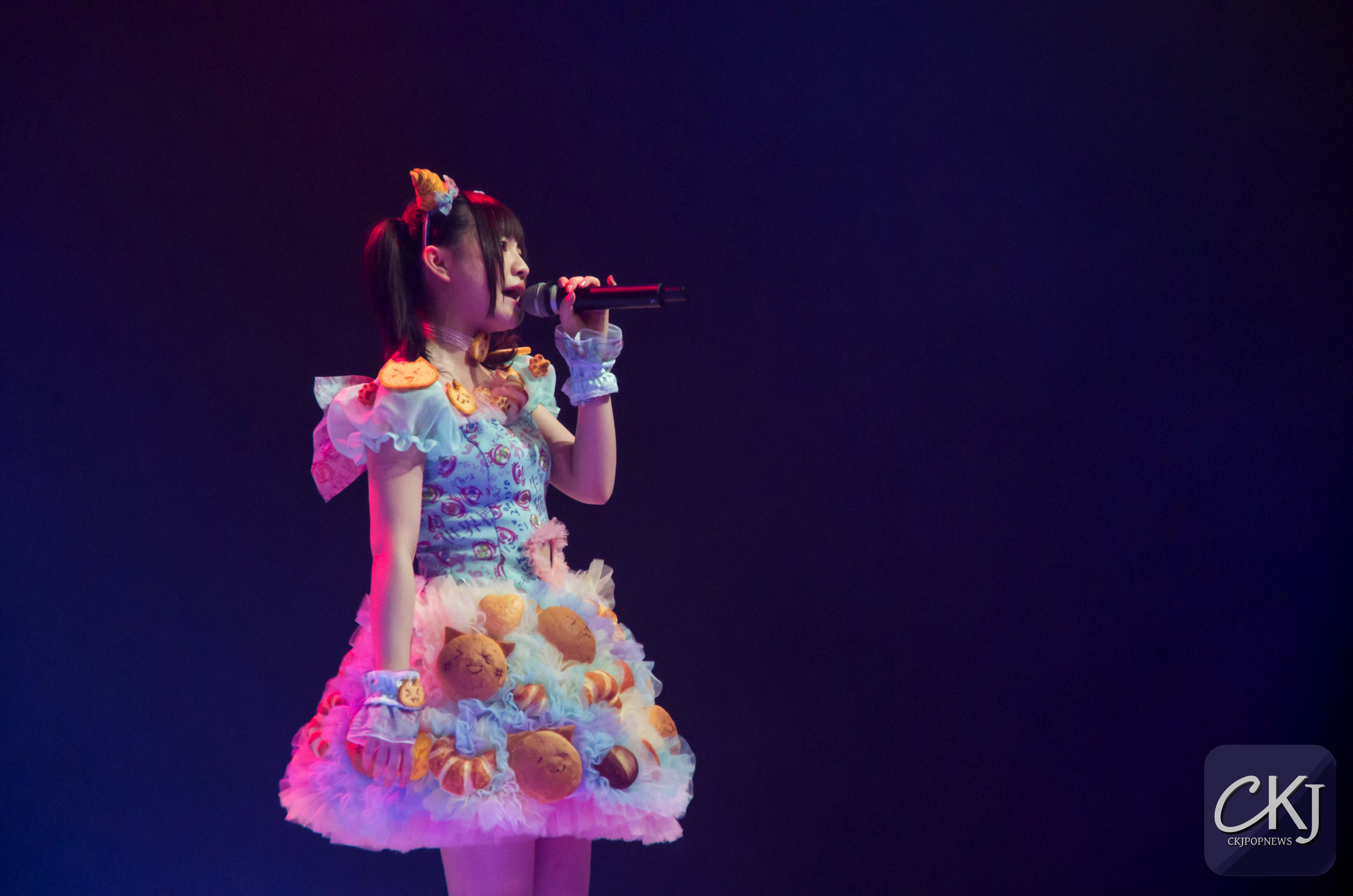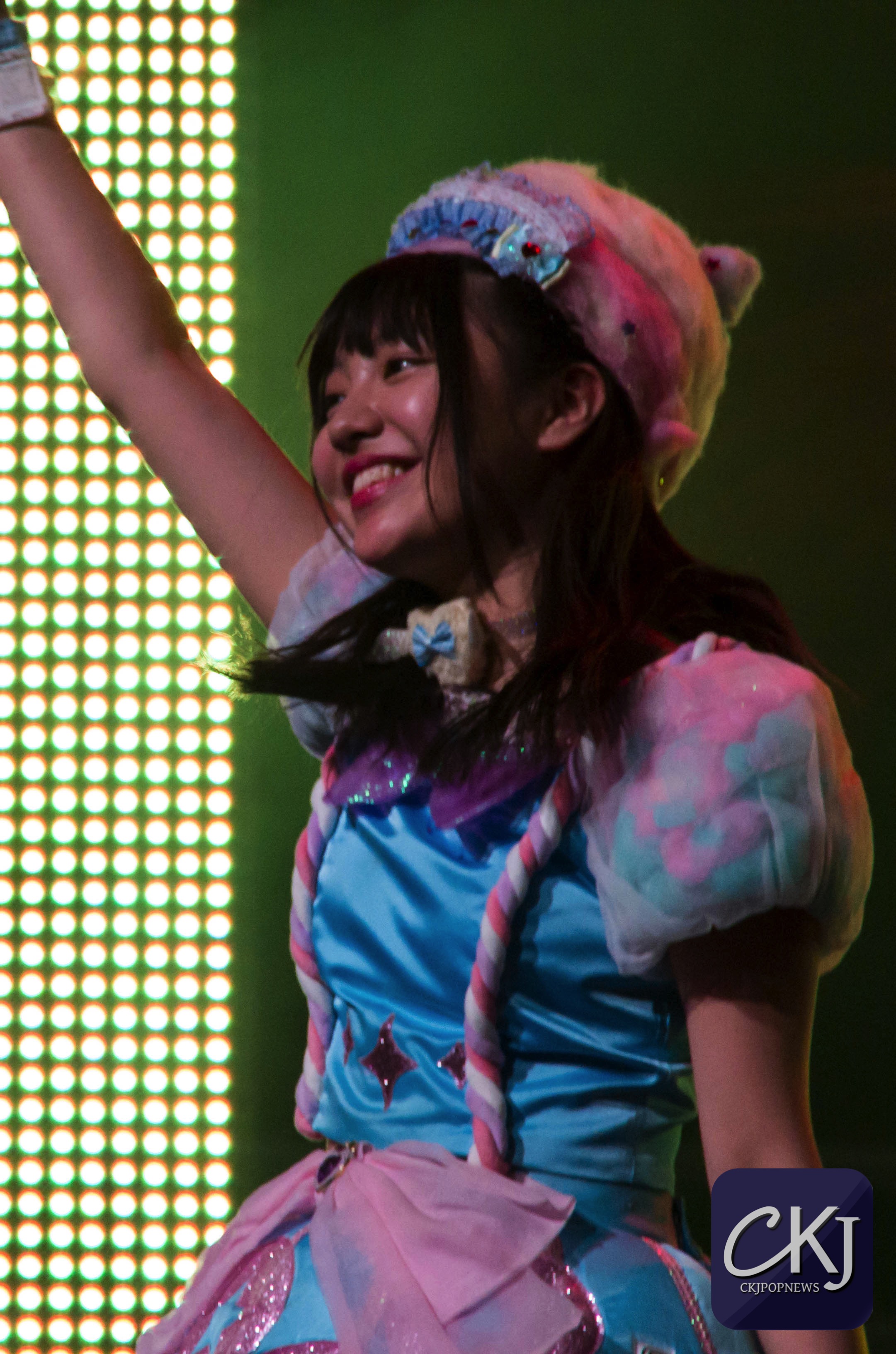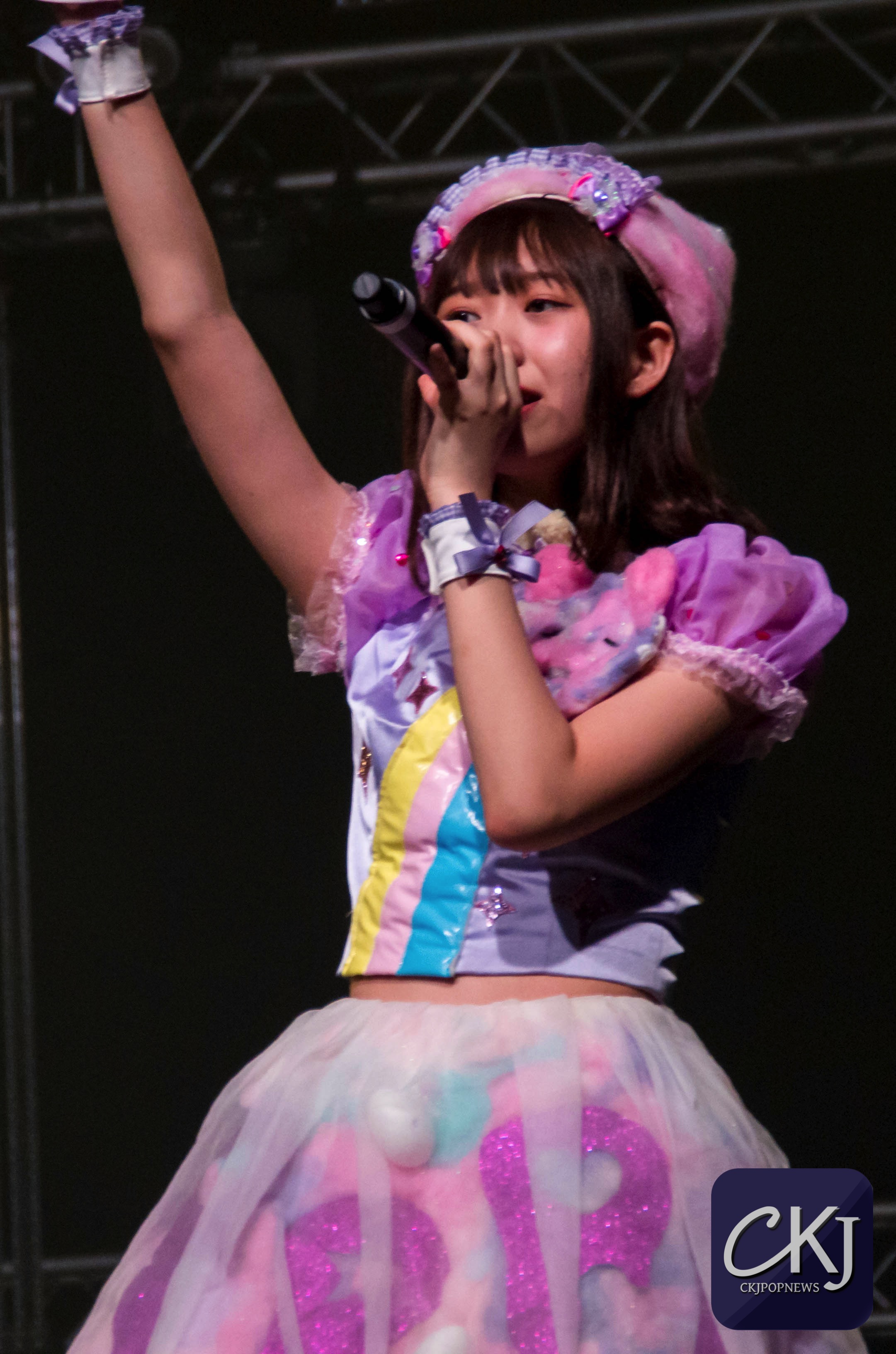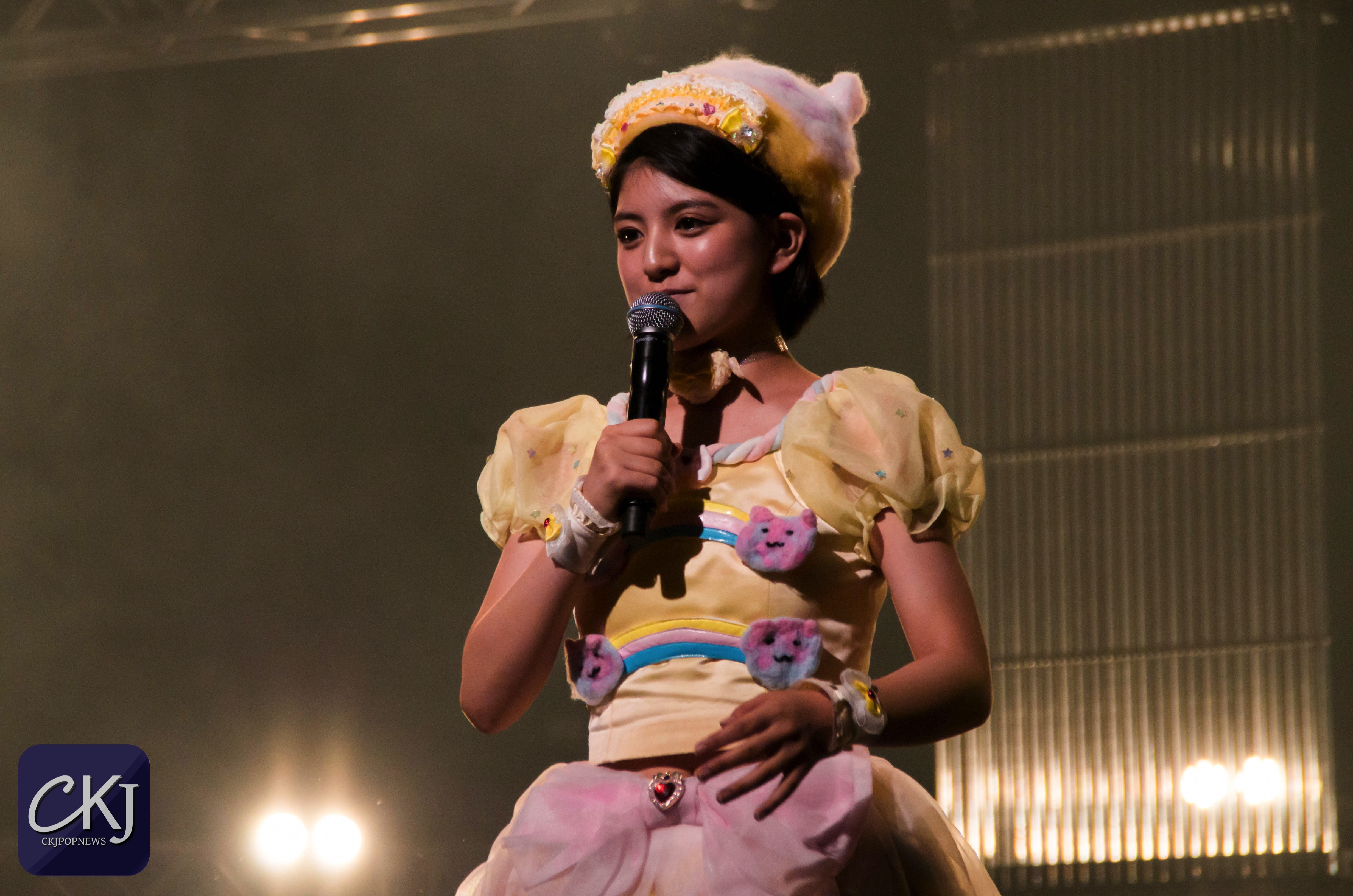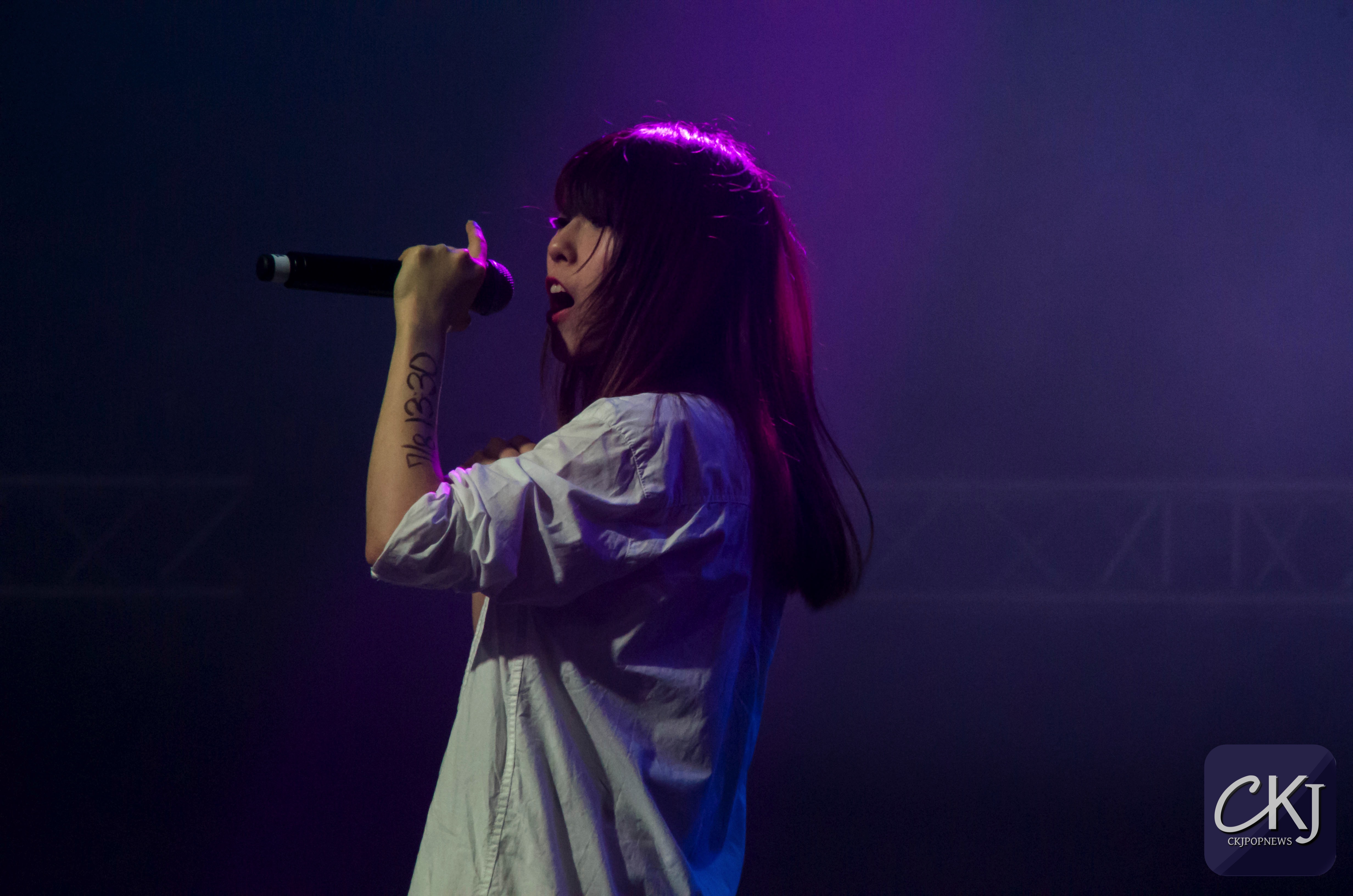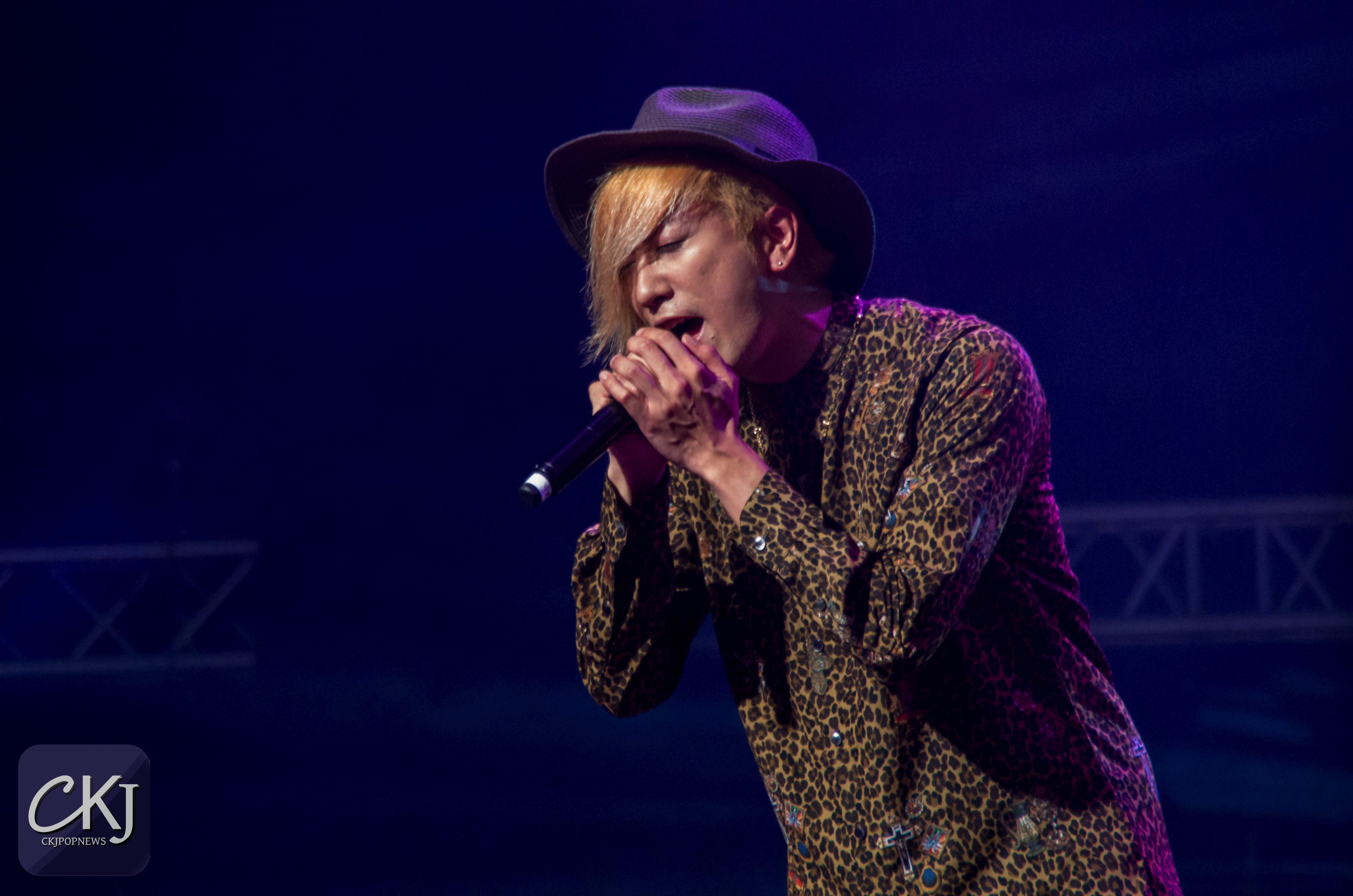[Interview disponible en français en première page]
For the 18th edition of Japan Expo, CKJ’s team came to Villepinte as we announced before the beginning of the event. After Japan Expo, we don’t do reports only about live shows within the festival, we also meet artists to do some interviews. Today, it’s the report about our meeting with the idol group The World Standard, and their sound producer Manaka Suzuki, that we release. As their concept indicates, the five cute girls answered questions of the media in different languages, which are Japanese, Korean, Chinese, English and also French.
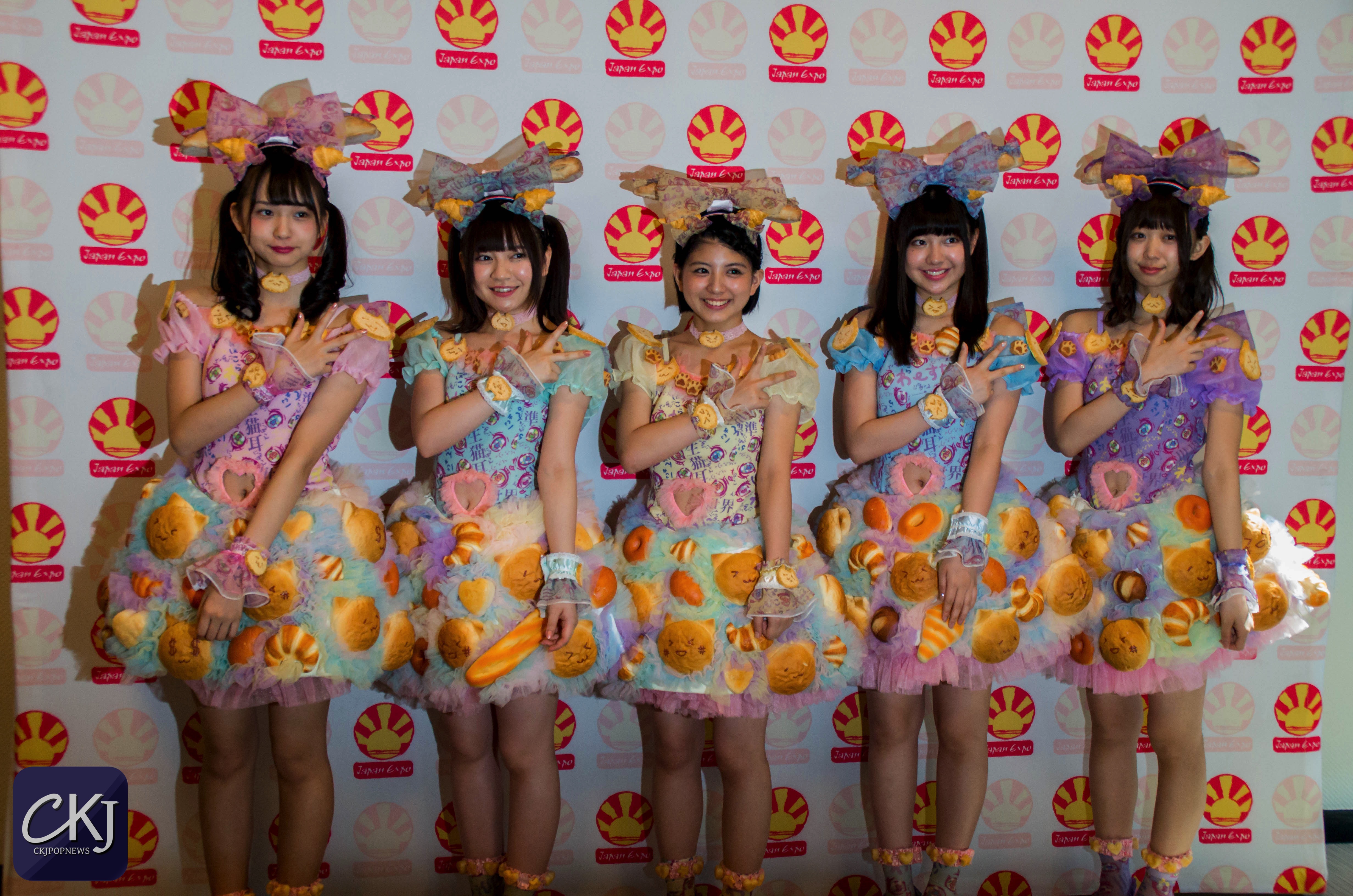
Could you present yourselves?
Ruka Mishina: I’m going to présent myself in Korean, my name is Ruka Mishina. Please take care of me. [in Korean]
Nanase Hirokawa: Nice to meet you everyone, my name is Nanase Hirokawa. I am 18 years old. Thank you. [in English]
Hazuki Sakamoto: Hi, I’m Hazuki Sakamoto. I’m 18 years old, I study French. [in French]
Ririka Kodama: Hi! Nice to meet you everyone. My name is Ririka Kodama. I’m 16 years old. I learn English. [in English]
Miri Matsuda: Hello, I’m Miri Matsuda. I’m 17 years old. Nice to meet you. [in Chinese]
What motivated you to become idols? What does it mean for you?
Miri Matsuda: I’ve seen idols in an anime and that’s how I became interested in idols. For me, being an idol means receiving courage, but also send courage to our fans. So I would like to share this through our dance, our music and social medial.
Ririka Kodama: By watching TV, I became fan of a few actresses and I wanted to become idol thanks to all I’ve seen on television. So, I attended a special school to become an idol, and give dreams to our fans.
Hazuki Sakamoto: I auditionned, and that’s how I became an idol. I would also like to give dreams and courage to our fans.
Nanase Hirokawa: At the beginning, I was interested in music and dance. I was a fan of Cheeky Parade and that’s the reason why I became an idol. For me, being an idol is also a way to share Japanese culture, kawaii culture and anime, so I want to spread these cultures through my activities.
Ruka Mishina: At first, I wasn’t really interested in an idol career, but someone invited me to auditions, I participated and I was accepted. That’s how my career began. So being an idol is a gift to me, we offer something to someone else through dance and music.
Did you know each other before being The World Standard, or did you met when you became Wasuta?
Miri Matsuda: Before forming The World Standard, we were trainees and we knew each other a little bit. At the time, we performed some stages together, and we got along well.
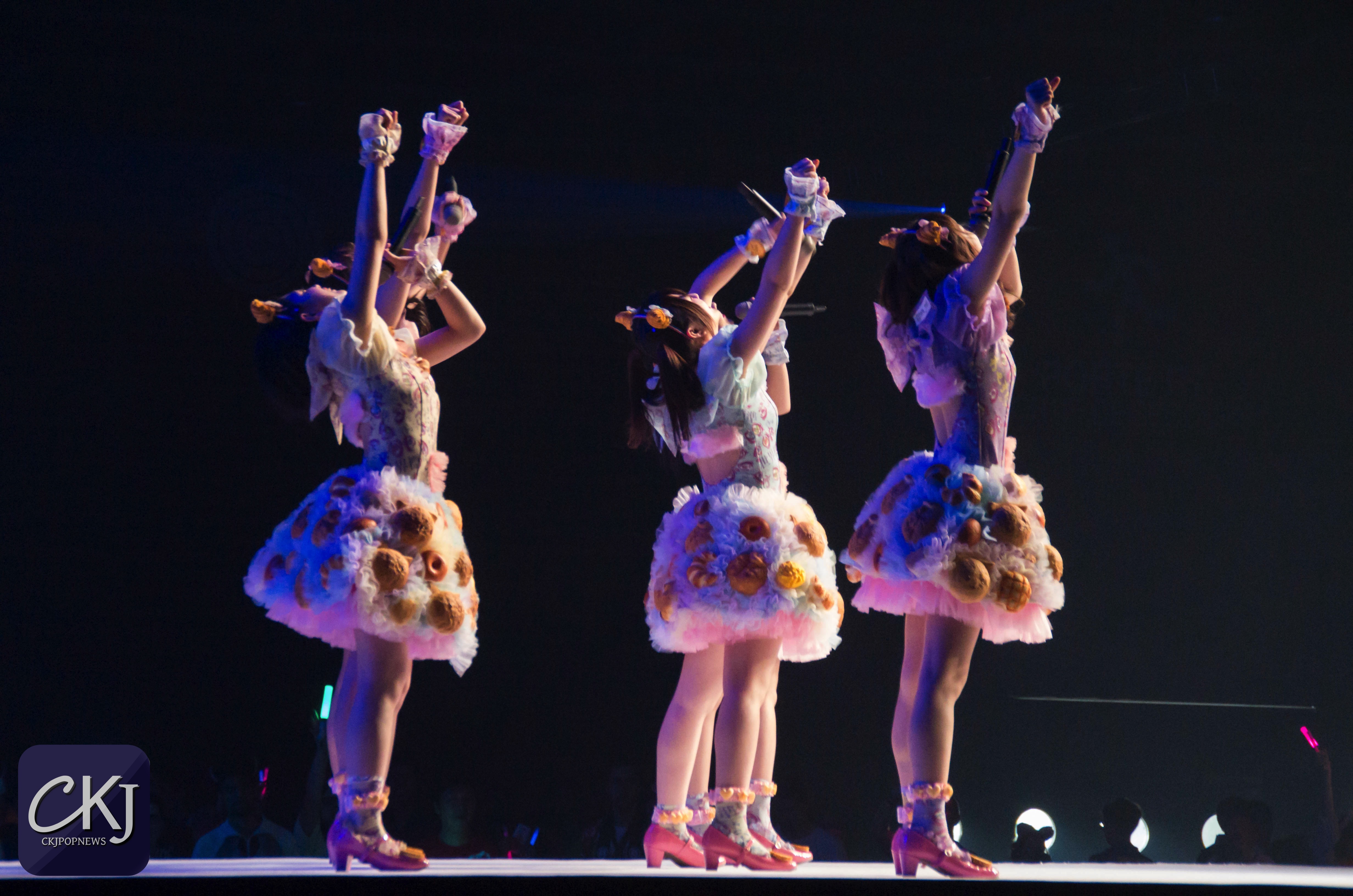
You’re a band that is said to be properly attuned to the digital age. How do you différentiate yourselves from the other idol bands?
Nanase Hirokawa: To post something online on our platforms, we study English, Chinese, French and Korean [to post in these languages]. Please send your photos [of us] by Twitter and our other social network.
As you said before, you’re well connected and close to your fans on social media. Do you think you have a special relationship with your fans thanks to social media?
Ruka Mishina: Thanks to social media, fans teach us a lot of things, and we’re able to share a lot with them too! In this way, we feel that our feelings are mutual and we seem all close. So yes, social media keep us close with our fans.
Japan Expo invites idols for several years now, and the public changes: we can see more women and a wider age range, did you feel that too?
Ruka Mishina: As our concept is a kawaii concept, we’ve got a lot of female fans. Almost half of our fans are women when we perform live.
You’ve performed in several countries overseas, how do you feel about having foreigner fans?
Ririka Kodama: Before really debuting, we stayed in Japan, but after our debut we went to different places around the world as Shanghai, Singapour, Taïwan, Thaïland and now we’re here in France. Regarding our fans, the atmosphere is different whether we perform in Japan or abroad. Every time, it’s a great pleasure for us to discover fans outside of Japan.
Miri Matsuda, you’re a fan of the baseball team Hiroshima Toyo Carp and you recently sang for the opening of a game in a stadium, how did you feel at that time?
Miri Matsuda: I didn’t think I was able to do this, and I was really stressed because it’s completely different from what I usually do with Wasuta. It was also the first time that I sang in front of a lot of people, because more than 30,000 persons attended this game. I really enjoyed this experience. Hiroshima Toyo Carp’s fans have red accessories and outfits, and when I saw the public it was like a big red area, I found it really beautiful.
You’re really skilled with foreign languages, was it something you liked before forming Wasuta or did you work on it after, in order to spread Japanese culture all over the world?
Hazuki Sakamoto: We started learning foreign languages after forming Wasuta, because we wanted to spread the kawaii concept to the entire world. That’s how we ended up learning foreign languages.
Where do you find inspiration for your music videos and your songs?
Manaka Suzuki [Sound producer of the band]: I draw inspiration from daily life, when we’re happy or sad. I wanted to write down these feelings in the lyrics of my songs. It may seem weird for other people, but that’s how I see things when I write songs.
Among all the music videos you filmed until now, what is the best memory that you keep?
Miri Matsuda: The most unforgettable for me is the first music video we ever filmed, “The World Standard : Ultra Mirakurukuru Final Ultimate Chocobeam“, and the main topic was RPGs. We used some animation and during the filming we used a green background, it was unforgettable. As it was our first music video, it was also something new in our careers.
Nanase Hirokawa: For me, it was “The Perfect Idol“, because we usually wear outfits with pastel colors, but this time we had black and white clothes. Furthermore, we had extravagant hairstyles and make-up, it was really fun filming this music video.
Ririka Kodama: In my opinion, “Inu Neko. Seishun Massakari” was unforgettable because we did it with our fans. At the beginning, we thought that we had to highlight only our members [in music videos], so it gave us a really unique experience. More than that, we made a live during the filming, and fans have seen what it was like at the same time as us. This feeling of working together with fans has been a new experience.
“Just be yourself” music video was filmed vertically, was it especially to adapt yourselves to the digital era and smartphones? Can we expect more creative formats in the future, as 360° music videos?
Manaka Suzuki: Regarding music videos, we’re not really in charge of it. We have a special team for music videos, and they try to see what Wasuta members want to show in their music videos. As I really liked “Just be yourself” music video, and the persons who saw it too, I think the possibility of filming music videos like this again is real.
Regarding “The Perfect Idol” music video, we can think of the negative side of idols careers when we see it for the first time. What’s the real meaning behind the lyrics and the music video?
Manaka Suzuki: It’s indeed the negative side that we wanted to show. I feel like sometimes idols force theirselves, and I would like to show the contrary, that they are happy to sing and dance. So, it’s the main idea behind the music video and the song “The Perfect Idol”.
This year, two of the members, which are Hazuki Sakamoto and Nanase Hirokawa, participated in animation of the Nico Nico Dōga stream about the Senbatsu Sousenkyo of AKB48. Are you fans of this band and did you vote for a particular member?
Hazuki Sakamoto: I was really happy to be selected to host this event, and I event bought the book AKB Sounsenkyo to work on it. In my head, AKB48 are the most representative idols who exist. I’m still working on it to discover more about this universe.
Nanase Hirokawa: I’m really surprised by this question! (laughs) I love everything about idols, as SKE48, NMB48 or AKB48. I’m really envious regarding the success of AKB48 overseas, as in France or Shanghai for example. I want us to become idols like them. Otherwise, I also like Nogizaka46.
You were trainees together before debuting as The World Standard, did you always dream being idols or did you have other dreams when you were younger?
Ruka Mishina: I never thought I was going to be an idol. I did a lot of hip-hop and dance, but I didn’t had a clue I was going to end up as an idol, even though I really like AKB48 too.
Ririka Kodama: At first I was interested in media, and I wanted to become an actress. But when I attended school, I was told to audition. I finally passed and I became an idol.
Nanase Hirokawa: I really loved idols and I wanted to become one myself. Indeed I was really glad I did it at the audition. I think idols are able to multitask, whether it’s singing, dancing or modeling. I guess we’re all really happy with our careers now.
You held a concert at the famous venue Zepp Diver City last April, which was an important step in your career, which other venue would you consider as the nest step?
Ruka Mishina: We don’t have any concerts for now, but at fall we’re playing in 9 different cities in Japan, and it will continue during spring and summer. That’s true we would like to perform at a bigger venue someday.
Regarding animation, would you be interested in dubbing in the future?
Nanase Hirokawa: We handled the opening theme of PriPara anime, and it influenced us a lot. I found the voices of the characters really really cute, and discussed about it. So why not dubbing some day?
Japan Expo is an event where you can find a lot about Japanese culture, as manga, video games or animation and music. Among everything you can find at Japan Expo, what do you all prefer?
Ruka Mishina: I like video games and anime better, and among animes I really like Sword Art Online.
Hazuki Sakamoto: I really enjoy watching animes for children like Doraemon, which is also well known in France, and Chibi Maruko-chan which is still on TV [in Japan].
Nanase Hirokawa: I also like animes, especially Attack on Titan, because I watch over and over again. I’m impressed that here at Japan Expo some cosplayers have flags related to this anime.
Ririka Kodama: We already performed covers of anime songs, as on Ichigo Stage and Karasu Stage [editor’s note : stages within the festival], and that’s something we really enjoy.
What’s your favorite anime for the project “Animé 100” [editor’s note : “Animé 100” was the main theme of Japan Expo this year, to celebrate the 100th anniversary of the animation]?
Ririka Kodama: I love the anime Chibi Maruko-chan, which is still on TV in Japan nowadays. I try being often at home to watch it on TV.
Nanase Hirokawa: We all like Pokemon, and its main character Pikachu, because we’ve all been there. But personally, I really enjoy watching Cardcaptor Sakura, and I wish everyone to watch it too someday.
Yesterday, you participatif in the Animé 100 concert alongside with Umi-Kuun and Kamitsuki, did you like sharing the stage with artists really far from your kawaii universe?
Nanase Hirokawa: We were really glad having the opportunity to participate to this event with different people, and the public was different too. It was a good occasion to present The World Standard to other people. Furthermore, we already collaborated with artists different from us, as for the Tokyo Game Show which takes place in the capital city, and we sang and danced on stage alongside with artists from other musical universes.
How do you see the French audience in comparison with other audiences or event Japanese fans?
Nanase Hirokawa: We find French fans very gentlemen. Even during the photoshoots, fans greeted and thanked us, even in Japanese, by lookting at us right into our eyes. We were really happy.
For this trip at Japan Expo, was it a real help having a member who speaks French? Did you ask Hazuki Sakamoto some questions to communicate with the fans?
Hazuki Sakamoto: I kind of hosted lives in French, I was really glad seeing the reaction of the fans and seeing they understood what I said. Even during tchats, I could say a few words in French and I was happy I was able to use the language that I learn within The World Standard.
Would you like to come back in France to perform, outside of Japan Expo?
Nanase Hirokawa: For the moment, we’re not planning on performing in France outside Japan Expo, but we’re really thrilled that we could meet French fans, and we would like to hold concerts here, whether it’s at Japan Expo or not. We hope our fans can’t wait for us coming back here!
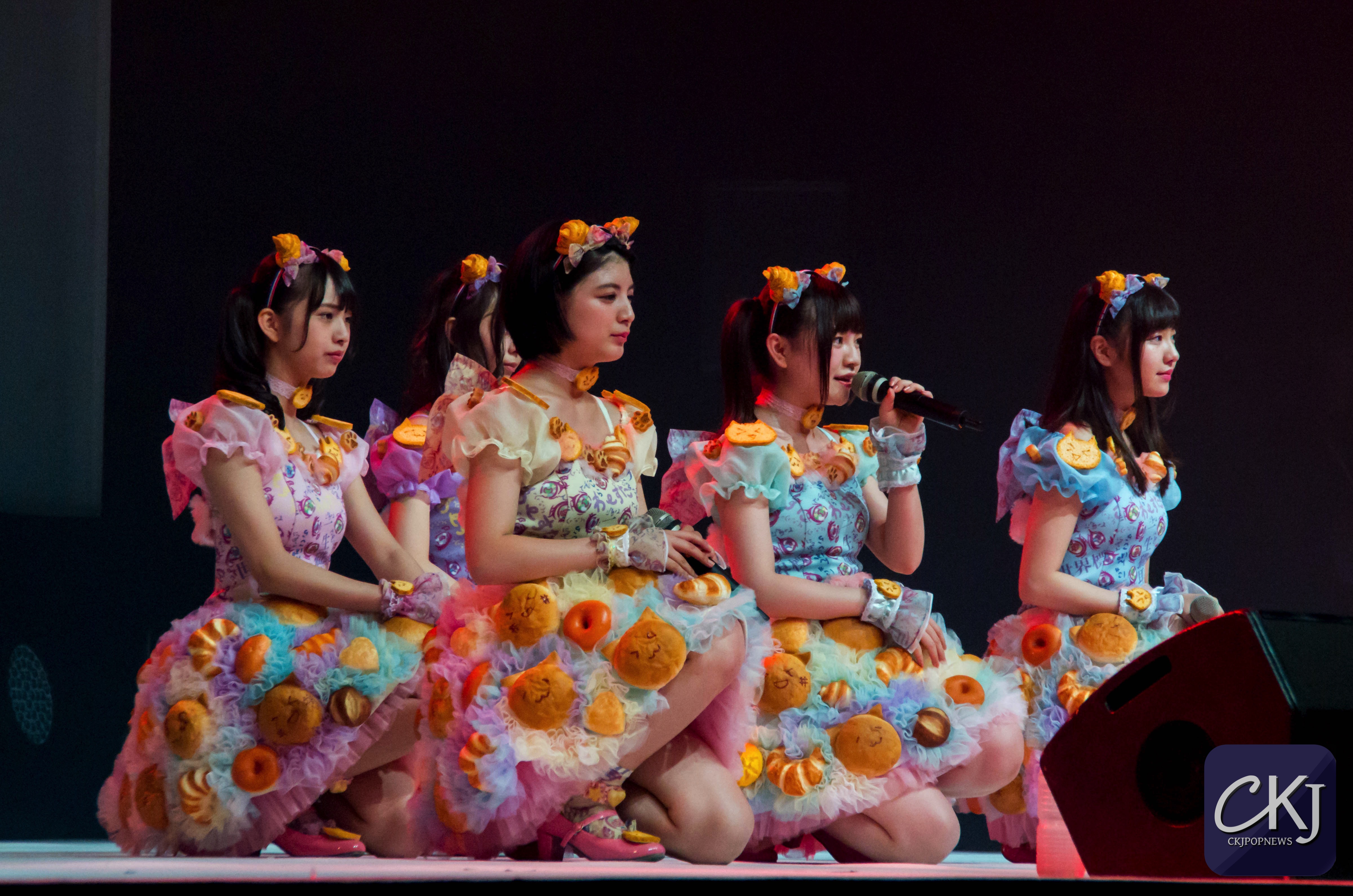
The kawaii culture phenomenon is not really spread in France yet, do you have any advices for the persons who wish to live daily with this culture?
The World Standard: Our concept is The World Standard so we are called The World Standard, Wasuta. We are a Japanese Idols group introducing kawaii to the world so we do idol promotions on social media. Our clothes are so kawaii! And also our songs. It’s world music.
Kawaii is the concept of your band, but does it have an impact on your daily and private lives outside of The World Standard?
Ruka Mishina: In our private lives, we’re more likely dressed in black and white, more basic colors, and I don’t think we really live with the Wasuta concept in our private lives.
Nanase Hirokawa: It’s almost impossible to dress as extravagant as Wasuta in private life, but I do like kawaii accessories. For example here in France, I found a lot of shops which are selling really kawaii accessories, and I bought a ring with a shark on it. I usually like uncommon things, like food prints. We really like sushi prints, or bread prints like we’re dressed right now. In our daily lives, we rather wear kawaii accessories.
According to you, who is the more kawaii among the five of you?
Nanase Hirokawa: It’s not really nice! (laughs)
Ruka Mishina: When we watch our music videos, we have the opportunity to really observe the other membres of the band. Each time, I find them really cute, and it makes me a little bit sad. (laughs)
Nanase Hirokawa: As our concept is kawaii, I think all the members are very very cute. Sometimes, when the membres change their profile pictures, I save it on my phone. I also take pictures of the members when they eat, and I put all the pictures in a dedicated file on my phone. (laughs)
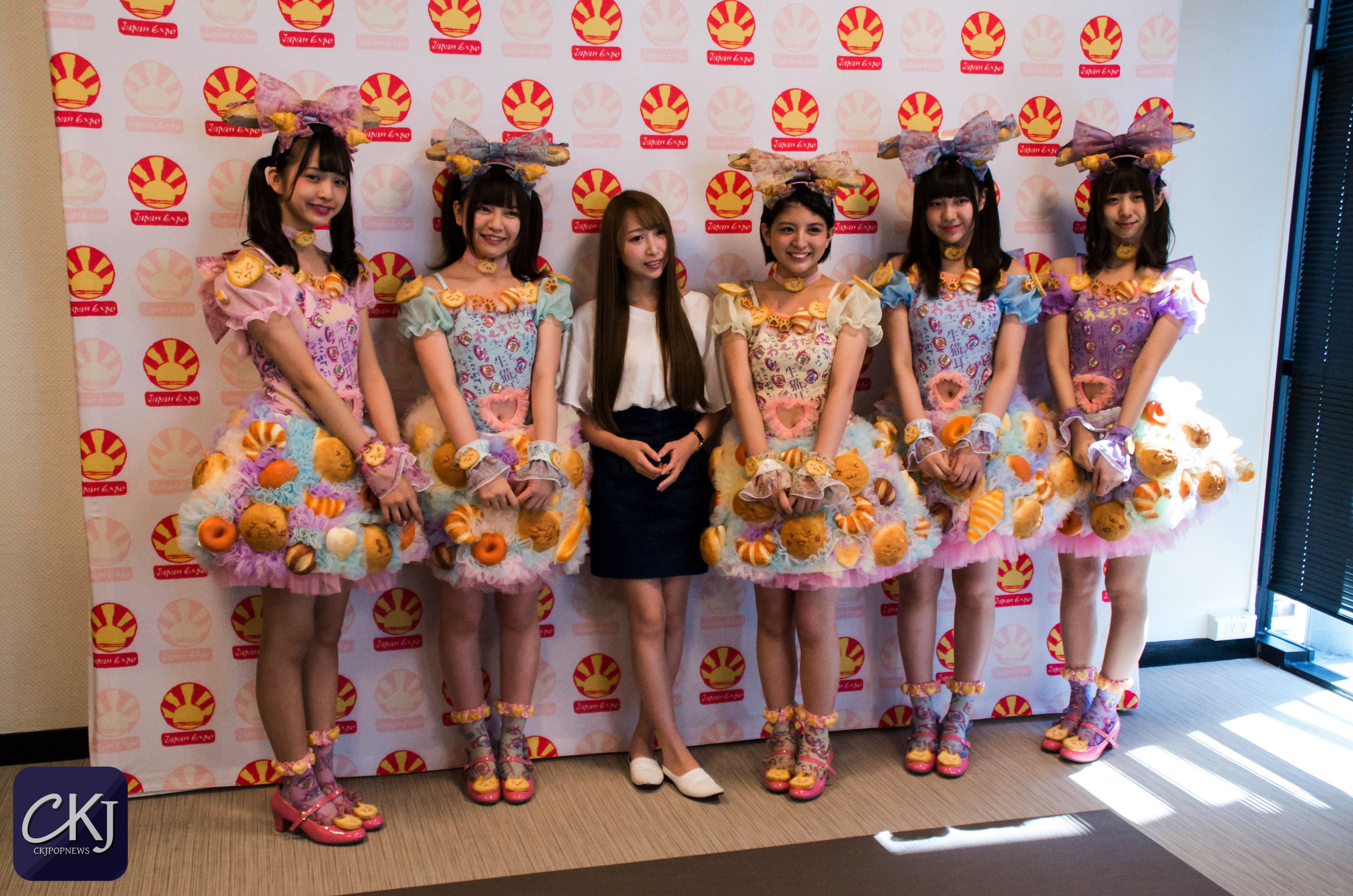
You precisely wear breads and pastries on your dresses, what is your favorite pastry on your outfits?
Ruka Mishina: I want to eat French bread. [in Korean] My favorite is the baguette.
Miri Matsuda: On our outfits, we all have a bread we already bit, so you can see teeth marks. (laughs) Regarding breads, we have soft and smooths ones on our dresses, and we really like to touch it, but there are also really solid ones.
Ririka Kodama: I like French bread. [in English]
Hazuki Sakamoto: I would like to eat pastries with almond cream, I ate that once and it was really good. [in French]
Nanase Hirokawa: Croissant, number one! [in English]
In the lyrics of the song “Yuumei ni, Nyaritai“, you say that you would like to stroll in Paris and go see Mona Lisa. Did you have the opportunity to do so?
Hazuki Sakamoto: No, sadly we didn’t have the time yet to go visit her, but we would like to shake her hands! (laughs)
What are your next projects?
Ririka Kodama: I want to become the most active and the sexiest artist in the world. [in English]
Hazuki Sakamoto: We aim at holding concerts in a lot of countries. I currently study foreign languages and I want to promote Japan.
30- To conclude this interview, do you have a message for your French audience?
Hazuki Sakamoto: We’re The World Standard, Wasuta! We’re truly happy to come here in France. We want to do our best to come back and do a one-man live. Thank you for your support. Thank you very much [in French]
The World Standard: Thank you very much!
We would like to thank The World Standard and their staff for the time and their kindness,
and also the staff of the festival Japan Expo for making this interview possible!
